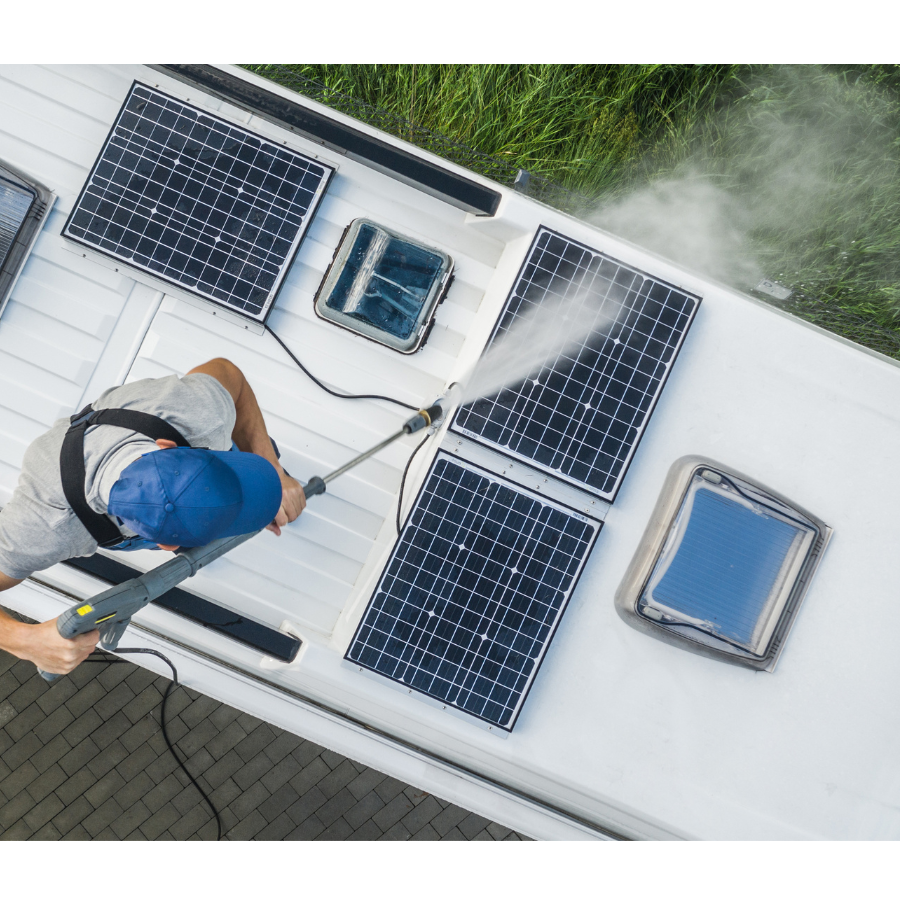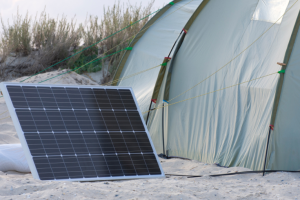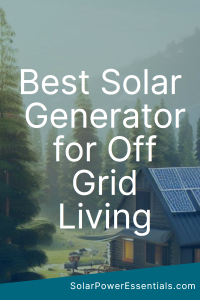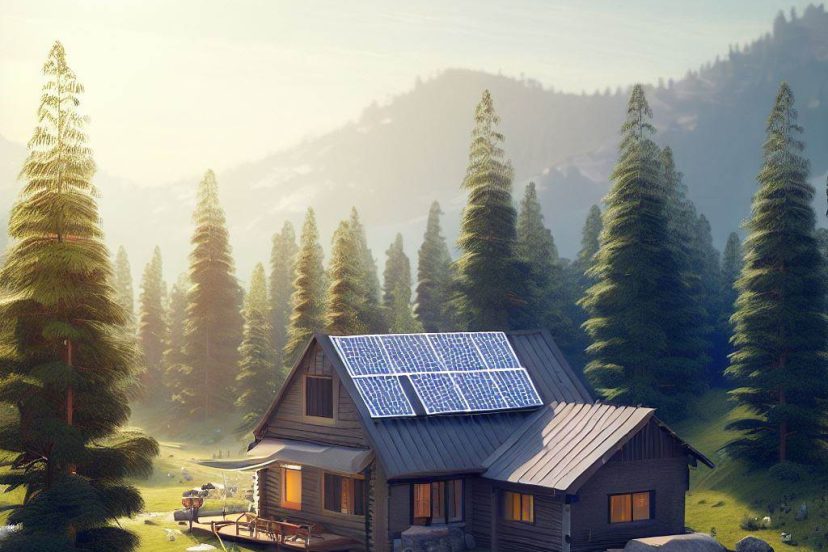Best Solar Generator for Off Grid Living
As an Amazon Associate, I earn from qualifying purchases, at no additional cost to you. Disclaimer
Understanding Off-Grid Living
What is Off-Grid Living?
For many of you who may be unfamiliar with the term, off-grid living is a unique lifestyle that can be best described as a self-sufficient one. You disconnect yourself from the public utilities such as electricity, water, and sewage, and rely on your own sources to provide these necessities. You’re reading this right – it’s about being self-reliant and not being dependent on society’s traditional supply systems. And to start off on this journey I’m going to share a few tips on how to find the best solar generator for off grid living.
Picture this: You live in a place where you generate your own power, harvest your own water, manage waste, and often grow your own food. There’s no waiting on the electricity company to fix a power outage or the city to repair a broken water line. You’re in charge. You’re the one who controls your utilities, not a faceless company. It’s about taking your needs into your own hands. It’s about freedom and independence.
I remember when I first ventured into off-grid living, it seemed a bit daunting. I won’t deny, it was a learning curve. But here’s a piece of advice – take it one step at a time. Start with something small, like installing a few solar panels or setting up a rainwater harvesting system. As you gain confidence and skills, you can take on larger projects.
Benefits of Off-Grid Living
Living off the grid comes with numerous benefits that not only contribute to personal growth but also help conserve the environment.
Financial Independence: One of the main advantages I’ve enjoyed since embarking on this journey is financial freedom. No more utility bills. The sun and rain don’t send you a monthly invoice. You invest initially in setting up the infrastructure, and then it’s virtually cost-free.
Environmental Conservation: It’s no secret that our traditional power grids and utilities aren’t the friendliest to Mother Nature. By going off the grid, you can reduce your carbon footprint, contributing to the conservation of the environment. It’s a feeling of fulfillment, knowing that you’re doing your bit to protect our planet.
Resilience: Living off-grid makes you resistant to disruptions. Power outages due to storms or grid failures are no longer your concern. I recall a major blackout in our city a few years back. The whole neighborhood was dark and powerless. Yet, there we were in our off-grid home, lights shining bright, just another normal evening for us.
Personal Growth: Lastly, off-grid living promotes personal growth. You develop a new set of skills. You learn about solar power, water conservation, waste management, and so much more. It’s a continual learning process, and let me tell you, it’s an empowering feeling, being so self-reliant.

The Importance of Solar Energy in Off-Grid Living
How Solar Power Works
If you’ve ever basked in the warmth of the sun and wondered how such a natural resource can be harnessed into energy, then you’re already thinking along the lines of solar power. Simply put, solar power works by converting sunlight into electricity, a process achieved with the help of solar panels and connecting them to the best solar generator for off grid living. It’s like having your personal power station, right there in your backyard, tirelessly working while you go about your day.
Picture solar panels as the gatekeepers, collecting sunlight and initiating the process of conversion. The solar cells within the panels convert sunlight into direct current (DC) electricity. From there, this DC electricity goes into a solar generator where it is stored and ready for use.
Now, here’s the interesting part. Our household appliances use alternating current (AC) electricity. So how does DC electricity become usable? Enter the inverter, the unsung hero of the solar generator. This ingenious device converts DC electricity into AC electricity, the kind your appliances can use.
When I set up my first solar power system, I was amazed at how simple yet effective the process was. It was like a light bulb moment, quite literally! Remember, you don’t have to be a tech whiz to understand or set up solar power. All you need is a basic understanding, and you’re good to go.
Why Solar Energy is Key for Off-Grid Living
So, you’re wondering, why is solar energy so important for off-grid living? The reasons are plenty, and they’re compelling.
Renewable & Abundant: The sun, the source of solar energy, is an abundant and inexhaustible resource. Every day, it rises, radiating energy far more than we could ever use. By installing solar panels and a solar generator, you tap into this vast energy reserve, harnessing sunlight to power your off-grid home.
Cost-Effective: After the initial setup cost, solar power is practically free. The sun doesn’t charge you for the light it provides. Over time, the cost savings are substantial. You’re free from the tyranny of monthly utility bills. I remember the joy of seeing my first $0 electricity bill. It was a moment of triumph!
Eco-Friendly: Solar power is one of the cleanest forms of energy. It doesn’t emit harmful greenhouse gases or contribute to global warming. By choosing solar energy, you’re not just going off the grid; you’re also doing your part to conserve our environment.
Self-Sufficiency: By relying on solar power, you’re enhancing your self-sufficiency. There’s a profound sense of independence and security that comes from generating your own electricity and storing it in the best solar generator for off grid living. In my early off-grid days, I faced a few hiccups, especially during the rainy season when solar output was less. But over time, I learned to manage my power usage and even invested in additional storage capacity. It was all part of the learning journey.

What is a Solar Generator and How Does it Work?
Understanding Solar Generators
If you’re new to the world of solar power, you might be wondering, what exactly is a solar generator? Well, let me break it down for you. A solar generator is a system that converts solar energy into electricity, which can then be used to power various devices and appliances.
To put it in simpler terms, think of a solar generator as your own portable mini power plant. It harnesses the power of the sun and turns it into usable electricity.
A solar generator typically consists of three main components: solar panels, a battery, and an inverter. Each plays a crucial role in the conversion, storage, and distribution of power.
When I set up my solar generator, I was amazed by the harmony with which these components worked. It felt like a symphony of technology, where each instrument played its part to perfection.
How Solar Generators Work
Step 1: Harnessing the Sun
Solar panels are the starting point in the energy generation process. These panels are composed of small units called solar cells that capture sunlight and convert it into electricity. This process is known as the photovoltaic effect. It’s incredible to see these seemingly ordinary panels harness the power of the sun and initiate the energy generation process.
Step 2: Storing Energy
Once the sunlight is converted into electricity, it needs to be stored somewhere. This is where the battery comes in. It acts as a storage unit for the electricity generated by the solar panels. I fondly refer to my battery as my energy vault – it’s where I store all the valuable electricity for use when needed.
Step 3: Converting Power
Finally, there’s the inverter. Most of our home appliances use AC (alternating current) power, but the electricity generated and stored so far is DC (direct current). The inverter’s job is to convert this DC power into AC power. It’s like the translator, bridging the gap between the generator and our appliances.
When I first learned about this, I was fascinated by the role of the inverter. It might not be as flashy as the solar panels or as robust as the battery, but it plays an equally crucial part in the process.
EF ECOFLOW Solar Generator DELTA 2: A Hands-On Review
Having had the privilege to try out the EF ECOFLOW Solar Generator DELTA 2 paired with its 220W Portable Solar Panels, I was in for quite a treat. It’s no ordinary power station; it’s your ticket to endless energy while outdoors, an essential backup for home use, and the foundation for building an off-grid lifestyle.
Let’s dive into my experience.
Expandable Capacity: A Camper’s Delight
Starting with a standalone capacity of 1kWh, the DELTA 2 surprised me with its option to expand. On a recent camping trip, I hooked up an extra battery, and bam, I had up to 3kWh at my disposal. This makes it not just perfect for outdoor adventures like RVing and camping but also as a reliable home backup solution.
Super Fast Charging: When Every Minute Counts
One afternoon we had severe storm warnings and expected to lose power overnight. I checked the DELTA 2 to make sure we were set, and realized the backup power was low. The clouds had moved in, and I thought I was in for a long wait till morning. However, I plugged it into the wall outlet, it zapped from 0-80% in just 50 minutes! Plus, the 500W solar input meant that with both 220W bifacial panels connected, I knew I would get a full charge in about 3 hours the next day.
Two In One Solar Panels: Double the Fun!
Speaking of those solar panels, the 220W Bifacial Portable Solar Panel is nothing short of impressive. With the primary 220W side soaking in the sun’s rays and the 155W side absorbing ambient light, I witnessed faster charging than I had with other devices. It’s basically squeezing out up to 25% more energy from the environment.
Multiple Devices, No Problem!
During those severe storms we indeed had a power outage, and the DELTA 2 was my knight in shining armor. With its AC output of 1800W, I had more than 90% of my home appliances up and running. And guess what? I plugged in 15 devices simultaneously without any hitches. And for those high-wattage needs, the X-Boost technology did the trick, allowing the DELTA 2 to run appliances with up to 2200W output.
Durability that Shines
The 220W Solar Panels easily withstand a sudden rain showers during my camping trips, thanks to their IP68 waterproof rating. And, trust me, they are tough. Made from a single tempered glass piece, they endure rough conditions, proving 5x tougher than similar panels I’ve used.
| Features | Pros | Cons |
| Expandable Capacity up to 3kWh | Perfect for extended outdoor use & home backup. | Might need to buy extra batteries. |
| 7x Faster Charging | Saves time & ensures constant power availability. | Relies on good sunlight for solar. |
| 220W Bifacial Portable Solar Panel | Faster charging and 25% more energy capture. | Slightly bulkier than single panels. |
| Power up to 15 devices simultaneously | Versatile use without overloading. | Need to monitor power distribution. |
| Highly Durable Solar Panels | Withstands harsh weather & lasts longer. | Slightly heavier due to durability. |
The EF ECOFLOW Solar Generator DELTA 2 is a game-changer. It beautifully marries cutting-edge technology with practical everyday needs. Whether you’re an avid camper, RV enthusiast, starting your off-grid lifestyle, or someone who just wants to be prepared for unexpected power outages at home, this solar generator has got you covered.
With its expansive features and the ability to be both robust and efficient, I genuinely believe this is a worthy investment for anyone in the market for a reliable power solution.
Best Solar Generator for Off Grid Living: Key Factors to Consider
Power Output
The first thing you need to consider when choosing a solar generator is its power output. This is usually measured in watts, and it indicates the amount of electricity the generator can produce. You’ll need to ensure that the power output of your chosen generator can meet the electricity demands of your off-grid home.
When I was picking out a new solar generator, I made a list of all the devices and appliances I intended to power. From essential household appliances to my trusty camping gear, I calculated the total power requirement and then looked for a generator that could meet this demand. It takes a bit of number-crunching, but it’s a vital step to ensure you pick a generator that can handle your energy needs.
Battery Capacity
Another crucial factor is the generator’s battery capacity. This determines how much power the generator can store for use when the sun isn’t shining. The higher the battery capacity, the longer your generator can supply power during the night or on cloudy days.
I learned the importance of this the hard way. During my early days, I chose a generator with a smaller battery capacity. This often left me short of power during long winter nights. I quickly upgraded to a generator with a larger battery capacity and haven’t faced an issue since. So, make sure to consider this when choosing your solar generator.
Portability
If you’re someone who enjoys the freedom of movement, portability is an important factor to consider. Maybe you love camping or perhaps you have plans to relocate your off-grid setup in the future. In such cases, a portable solar generator can make your life much easier.
When I planned a recent off-grid camping trip, I was worried about how I would manage power needs. That’s when I decided to invest in a portable solar generator. It was a game-changer. I was able to enjoy the wilderness without giving up my electrical comforts. So, if mobility matters to you, go for a generator that’s easy to move and set up.
Quality and Reliability
Lastly, always choose a solar generator that is known for its durability and reliability. This means looking beyond the fancy features and focusing on the fundamentals. Does the generator have good reviews? Is it built to last? Is the brand reputable? These are all essential questions you need to answer before making a choice.
I’ve come to realize that reliability is a trait you can’t compromise on. After all, your solar generator is going to be a key part of your energy infrastructure. You need a generator you can trust, a generator that won’t let you down when you need it the most.
Choosing the best solar generator for off grid living can seem a little intimating, especially when you’re new to off-grid living. But with these key factors in mind, you’ll be well-equipped to make an informed decision. It’s all part of the exciting journey towards a more sustainable and self-sufficient lifestyle!
Conclusion
Choosing the best solar generator for off-grid living is crucial. Remember to consider power output, battery capacity, portability, and reliability. By doing so, you’re one step closer to the self-sufficient lifestyle you desire.
Frequently Asked Questions (FAQs)
1. How much power do I need for off-grid living?
The amount of power needed for off-grid living greatly varies depending on your lifestyle and the appliances you use. A simple setup might only need a few hundred watts, while a more comprehensive one could require several thousand watts. Before you set up your best solar generator for off grid living, be sure to calculate the combined wattage of your appliances to get an accurate estimate.
2. Can a solar generator power a whole house?
Yes, a solar generator can power a whole house, but the capacity to do so depends on the generator’s power output and the energy consumption of the house. For regular households with standard appliances, a powerful solar generator should suffice. However, for homes with high energy demands, multiple solar generators or a large, home-specific solar installation might be necessary.
3. How often do solar generators need maintenance?
Solar generators require very little maintenance compared to traditional generators. Regularly check and clean the solar panels to ensure they are working efficiently. The batteries usually need a check-up every few months.
4. Can a solar generator work on cloudy days?
Solar generators can still work on cloudy days, but their efficiency will be reduced. Solar panels can still collect sunlight even when it’s cloudy, but the output may be much lower compared to a bright, sunny day. A battery backup is crucial for these situations to ensure you still have power.
5. How long do solar generator batteries last?
The lifespan of solar generator batteries can vary based on the type and quality of the battery, as well as how often it’s used and maintained. On average, a good quality solar generator battery should last around 5 to 15 years. However, with excellent care and maintenance, some batteries can even last up to 20 years.
Disclosure: As an Amazon Associate, I earn from qualifying purchases.


